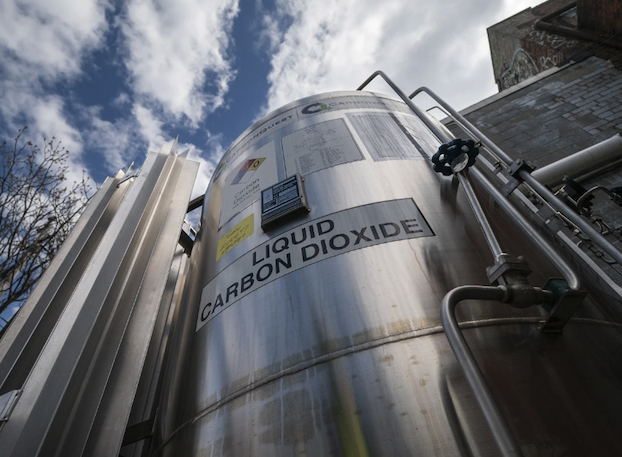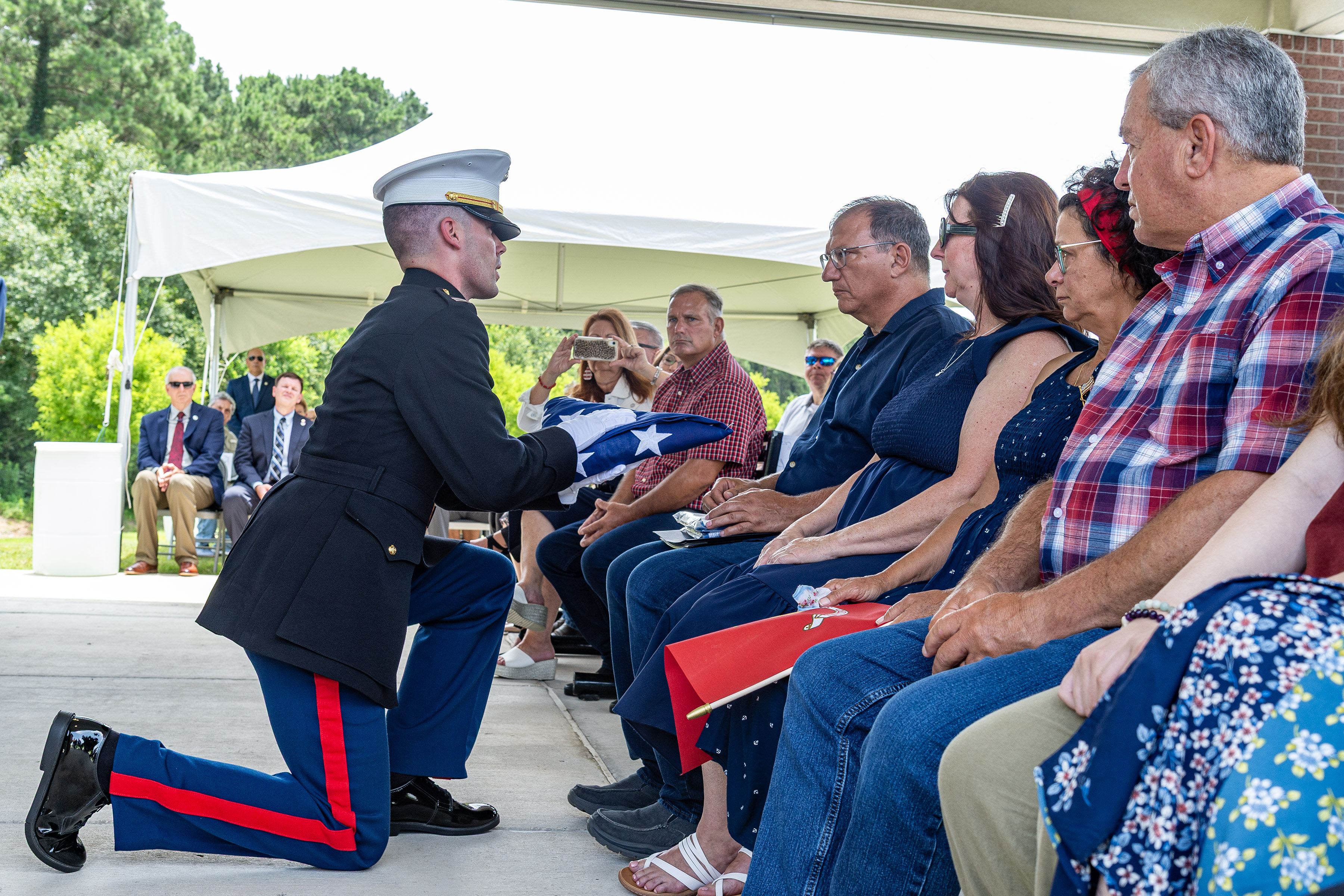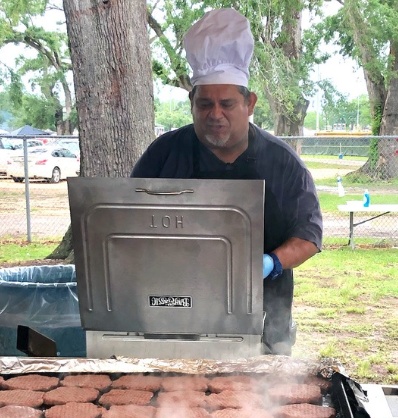Carbon capture projects in Allen Parish moving forward despite opposition voiced at meeting
Published 8:37 am Friday, May 2, 2025

- A liquid carbon dioxide containment unit stands outside the fabrication building of Glenwood Mason Supply Company in 2023, in the Brooklyn borough of New York. New York is forcing buildings to clean up, and several are experimenting with capturing carbon dioxide, cooling it into a liquid and mixing it into concrete where it turns into a mineral. (Associated Press)
Two controversial proposed carbon capture and sequestration projects in Allen Parish are moving forward with the necessary regulatory steps, despite opposition from local residents.
The Louisiana Department of Natural Resources and Energy held a public hearing Wednesday regarding two Class V stratigraphic test well permits. The permits are for ExxonMobil Low Carbon Solutions Onshore’s Hummingbird and Mockingbird carbon sequestration projects, both located in the Oberlin area extending to the Reeves and Elton areas.
The final decision on the permits will be made by the State Office of Conservation after reviewing the application and public comments.
According to ExxonMobil’s U.S. Gulf Coast Carbon Capture, Utilization and Storage (CCUS) Asset Manager Justin Carr, these test wells are research wells and will be used to collect core samples and other scientific data to assess the feasibility of potential future projects. The initial test wells will not be used for transporting CO2 underground.
“The two Class V wells will play an important role in determining whether Exxon will proceed with its proposed carbon capture and storage projects in the area,” Carr said.
While many Allen Parish residents voiced concerns about potential health and safety risks, including leaks, water contamination and school safety, Carr assured that the construction, design and operation plans meet all state and federal specifications, as well as ExxonMobil’s rigorous safety and environmental measures. The processes for the exploratory wells will also exceed the standard of oil and gas industry practices, he said.
“CCS uses proven technology to safely capture, transport and permanently store carbon dioxide more than a mile below down,” Carr said. “The CO2 will be stored under the same kind of impermeable layers of rock that have kept oil and natural gas locked underground for millions of years.”
Carr said the test wells would be drilled to about one and a half miles deep, while the actual disposal wells for a full-scale project would be much deeper.
According to Carr, the company has conducted extensive geological and hydrological assessments to identify optimal locations for the test wells. These evaluations reportedly found no existing legacy wells and no natural geological features that could compromise the integrity of a research well, he said.
Carr said Allen Parish, its landowners, and the state stand to gain substantial benefits from the projects.
“If we were to build and operate a project here, we would invest hundreds of millions of dollars in the parish and employ area residents throughout the construction phase,” he said. “Throughout both the construction and operational phases of the project tens of millions of dollars in revenues will be paid to the parish.”
Carr said the funds could support local schools, parks, roads and other public services. Additionally, he anticipated further indirect economic benefits as more companies seek to locate near CO2 storage facilities. He also mentioned that good neighbor grants would be provided to organizations, and CO2 incident training would be offered to first responders.
Resident Joe Manuel pushed for Carr to publicly confirm ExxonMobil’s financial commitments to Allen Parish.
“I want it to be known in a public record that this man, representing Exxon, guaranteed Allen Parish tens of millions of dollars on the record,” Manuel said, emphasizing the importance of accurate information for maintaining trust.
Despite ExxonMobil’s assurances, many residents continued to express concerns about the safety of the wells and potential risk to their health and drinking water during the public hearing.
“The Titanic wasn’t supposed to sink,” said Rusty Reeves, a member of the West Allen Parish Water District and local fire district. “The Deepwater Horizon wasn’t supported to blow out. Exxon Valdez wasn’t supposed to have happened. Satartia, Mississippi wasn’t supposed to happen.”
Reeves said he is concerned about the village of Reeves because its water wells are close to where the wells will be drilled.
“So when it starts getting out of that cavern, that hole, or whatever it is, it’s going to affect our water first,” he said.
Equilla Victorian raised concerns regarding the proximity of CO2 pipelines, some of which will be located within 500 feet of some schools.
“Depending on the size of the pipeline that ruptures, who is going to be there?” she asked. “If y’all do supply oxygen tanks and masks for kids, who is going to be there to assist these children? Some schools have special needs kids. How are they going to line these kids up and help them put masks and oxygen tanks to help them breathe with a pipeline 500 feet from the school?”
Linda Langley, whose grandchild attends a school near one of the wells proposed for the Coushatta Tribe Reservation in Elton, voiced deep apprehension about the ability to ensure the safety of students in the event of an incident.
“He goes to that school on the reservation, and you cannot convince me that anyone can get to him in time to save his life as you said,” Langley said.
Many attendees expressed disappointment with the Louisiana House Natural Resources Committee’s recent decision to reject bills aimed at impeding CO2 projects. These individuals feel that their concerns have been ignored by officials in Baton Rouge and large corporations.
Jordan Unkel, a resident living less than half a mile from the Denbury Green Pipeline and within 10 miles of a proposed injection site, conveyed her frustration over failure of the bills.
“I don’t understand how our safety is not worth it,” a visibly upset Unkel said. “I’m mad and I’m really upset. I’m aggravated and I’m really disappointed because I feel like they are choosing industry over my family.”
Allen Parish Police Juror and Louisiana CO2 Alliance Chairman Roland Hollins believes the legislative setback will negatively affect local residents and attributed the bills’ failure to actions of “big industry.”
He stressed the necessity of state support to ensure the protection of water resources, expressing concern that industry might not prioritize this as initially hoped. Hollins also highlighted attempts to pass legislation that would protect financially strained local water districts from potential contamination costs and questioned why companies like ExxonMobil would oppose measures requiring them to halt operations, notify officials and address contamination in the event of a leak.
Additional concerns included the need for increased fresh air supply and electric vehicles for first responders, the perceived lack of extra safety measures, and the feeling that local communities are being subjected to new technologies without adequate consultation or consideration for their well-being.
“Our communities out here are being forced with new technology, because the fact is everybody from industry likes to say we’ve been doing this for 45, 50 years,” Hollins said. “…If you’re going to force us, join us and help make us feel safe.”
Hollins referenced an incident involving CO2 injection that resulted in leaks and subsequent legislation in Illinois to protect water aquifers.
“Without our water, our lives in this community are over,” resident Dwayne Horton said. “Forget about yourselves. Think about the ones coming behind you.”
Katie McKeogh, along with a few out-of-town engineers and contractors, voiced strong support for the test well permits. McKeogh emphasized the role of CO2 in the future of energy and economic development for Louisiana.
“I’m here today to support the test well permit because it represents the future of energy in our state and it’s the kind of responsible innovation Louisiana needs to stay competitive,” McKeogh said. “…This test will is a critical first step and providing that we can produce the low emission energy the world is demanding and ensure that Louisiana is at the forefront of securing American energy dominance.”
She anticipates that CCS will contribute to economic growth and job creation, highlighting ExxonMobil’s history as a significant supporter of jobs, schools, infrastructure, and local services.
“We know there are questions, and that’s why test wells are so important to allow for data collection, monitoring and transparency,” she said. “And we know the Louisiana Department of Natural Resources has strict standards for their test classified wells and ExxonMobil has a record of meeting or exceeding those standards. I trust that safety and environmental protection and community engagement will remain front and center.”
James Lee of the Louisiana Mid-Continent Oil and Gas Association, said the storage sites are consistently monitored for any changes and that the primary principal of the permitting process, as mandated by the Safe Drinking Water Act, is the protection of underground drinking water sources.
“Since this Act, not a single case of drinking water contamination has occurred from permitted injection,” he said. “Today oil and gas companies are committed to safety. It comes first in all that they do, and their operations of CCS will be and cannot be any different.”
Patrick Riley, a chemical engineer and attorney representing the Louisiana Chemical Association, spoke in favor of the project highlighting Exxon’s long-standing and valued membership within the LCA, emphasizing the company’s commitment to safety, community engagement, and prioritizing transparency in their operations.
Riley described carbon capture and storage as a reliable and permanent method of storing CO2 deep underground, similar to how oil and gas deposits have been safely continued for millions of years. He noted the established monitoring practices in place to ensure the CO2 remains within designated areas.
“These are not new technologies,” he said. “They are well understood, heavily regulated and used across the country.”
He pointed out ExxonMobile extensive experience in safely transporting and managing CO2, including existing operations within Louisiana.
Approving the permit extends beyond scientific considerations, presenting significant opportunities and world class investments, he said.
“This permit represents a tremendous opportunity for Allen Parish to take a step forward towards leadership in a growing industry, clean investment, and the future of Louisiana,” he said.
Lena Venable, a consultant for ExxonMobil and native of Oberlin, expressed her belief that CCS will provide future generations with local jobs and careers.
“I think that this is a good thing for the parish,” she said. “We’re at the beginning of the process and these (permits) are for two test well, as has also been said, there’s a chance that the project may not locate here, depending on what the data and the science tell the folks that are looking at the data from the test wells.”
Other engineers and contractors from ExxonMobil, who are not local residents, also voiced support for the projects.
“We see these research wells as necessary to confirm key characteristics of the geology, including the quality of the storage formation and most importantly, the integrity of the overlaying seal,” Ryan Connors, vice president of mineral resources for Rayonier Timber and Land Management. “Gathering this information ensures that any future decisions are based on real data and sound science, not assumption.”
Holli Johnson, public affairs director for Rayonier Timber and Land Management, added, “Looking ahead, we see the exciting potential of carbon capture and storage for both Rayonier and Louisiana. “This technology holds the promise of enhancing our valuable timberlands and establishing independable revenue stream, strengthening our resilience during volatile market shifts. Moreover, we believe CCS offers transformative potential for Louisiana’s crucial pulp and paper industry, which often has an energy intensive process by enabling the capturing storage of carbon emissions.”
Jonathan Rice, attorney and hearing officer for the LDENR and Office of Conservation, said the purpose of the hearing was to gather public comments and not to provide answers to questions. He said the Office of Conservation will respond to all relevant comments made during the hearing.
“The purpose of tonight’s public hearing was to allow all interested persons an opportunity to enter into the record, relative oral or written comments concerning the injection and the draft permit.” Rice said.





